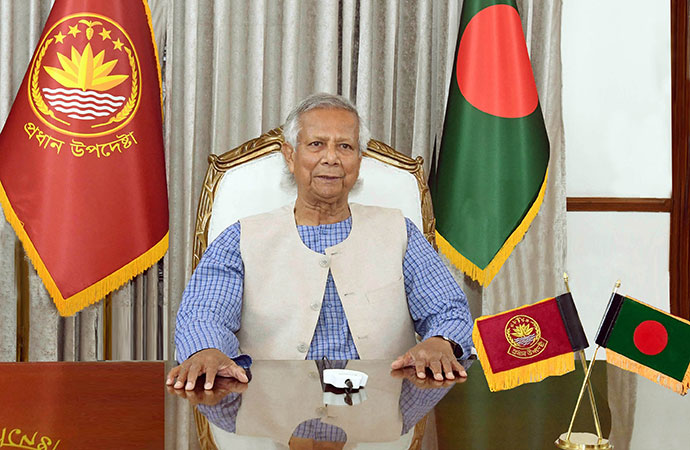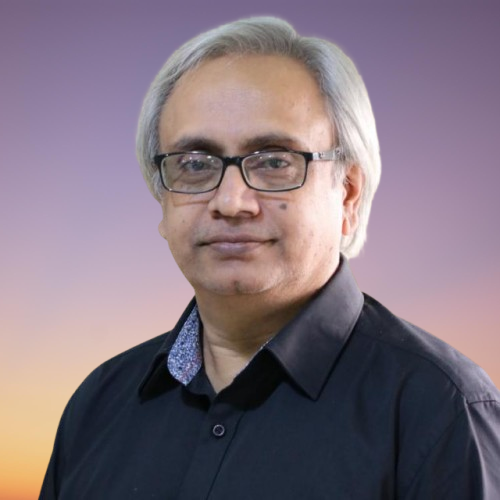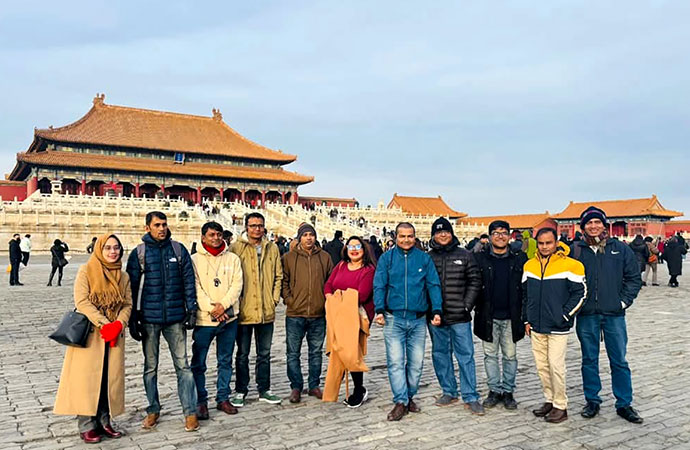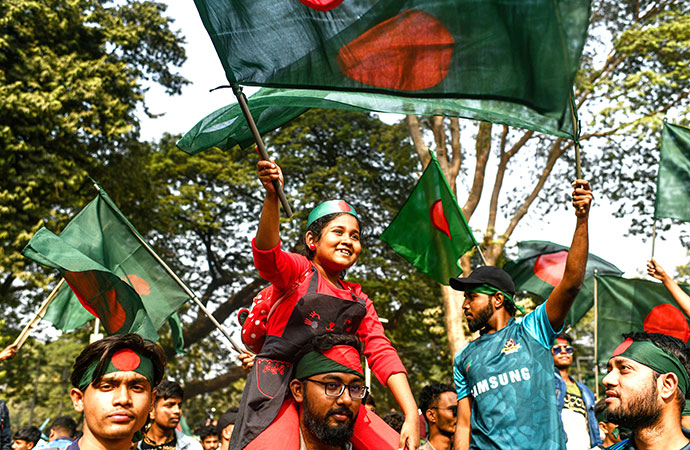Column

Chief Adviser Professor Muhammad Yunus. Photo: PID
Bangladesh stands at a crucial juncture as political parties, civil society and citizens engage in debates over reforms and the timeline for the next general election. The interim government, led by Nobel laureate Professor Muhammad Yunus, faces mounting pressure to balance comprehensive reforms with timely elections. Amid this tension, the nation struggles with differing views, confusion and uncertainty about its democratic future.
Reforms and the Call for Consensus
Professor Yunus, in his speech in a recent national dialogue on unity, reform and election, emphasised the necessity of consensus to drive meaningful reforms and hold credible elections. "Reforms without consensus and elections without reforms will not move Bangladesh forward," he declared. Stressing unity as the nation's core strength, Yunus underscored the interconnected nature of unity, reforms and elections.
Highlighting the sacrifices made during the July uprising, Yunus urged all stakeholders to seize this "extraordinary moment of opportunity." He called for a society where wealth and opportunities are equitably distributed, rendering distinctions like minority or majority irrelevant. "The identity as a citizen of Bangladesh should suffice," he said, advocating for simultaneous reform and election preparations to ensure an inclusive democratic process.
BNP's Perspective: Balancing Reform and Elections
BNP Acting Chairman Tarique Rahman reiterated the party's commitment to multi-party democracy and reforms. He criticised those spreading confusion about the elections and reaffirmed the party's faith in the people's verdict. "Reforms and elections are both essential to achieving a qualitative change in the state and politics," Tarique said.
While supporting the interim government's reform initiatives, he cautioned against neglecting citizens' daily struggles. Rising commodity prices and unresolved legal cases from the past regime remain pressing issues. Tarique Rahman also warned that conspirators could exploit delays or missteps in the reform process, undermining the spirit of the July-August mass uprising.
BNP Secretary General Mirza Fakhrul Islam Alamgir echoed these sentiments, urging for credible elections following essential reforms. He noted that sustainable democracy requires both electoral and economic power to be secured for the people.
BNP's Proposals
On December 9, the BNP urged the adoption of advanced technology, such as computing and AI, to update the voter list, replacing the traditional door-to-door approach ahead of the 12th National Parliament election. BNP standing committee member Dr Abdul Moyeen Khan emphasised the need for an accurate and efficient voter list and highlighted how technology can automatically include eligible voters and remove deceased individuals.
Dr Moyeen criticised the door-to-door method as time-consuming and error-prone. He outlined a 10-point electoral reform proposal, including amending the RPO, revising political party registration policies, strengthening the Election Commission, and introducing a separate electoral code for the media.
The BNP has submitted these proposals to the government's Election Reform Commission, aiming to ensure fair elections where voters can freely elect genuine representatives. Other committee members, Nazrul Islam Khan and Salahuddin Ahmed, stressed the importance of restoring the caretaker government system and said the reforms could be implemented within three to four months, paving the way for a quick national election.
Jamaat-e-Islami's Vision for Unity
Jamaat-e-Islami Ameer Dr Shafiqur Rahman called for unity among all anti-fascist political parties to build a "new Bangladesh." He criticised the Awami League's past governance and highlighted the youth's role in shaping the nation's future. "The sacrifices of the July uprising must not go in vain," he said, emphasising justice and national unity as cornerstones for progress.
On October 5, Bangladesh Jamaat-e-Islami presented 41 proposals for state reform during a press conference in Dhaka. Key reforms include:
Judiciary and Governance: Separation of the judiciary from the executive, with civil cases resolved within five years and criminal cases within three years. A two-term limit for Prime Ministers and a balance of power between the Prime Minister and President.
Elections: Restoration of the caretaker government system, abolition of electronic voting machines (EVMs), and ensuring free and fair elections.
Police and Anti-Corruption: Creation of an independent commission for police transfers and promotions, incorporation of moral education in police training, and empowering the Anti-Corruption Commission (ACC) to act independently.
Employment Reforms: Raising the maximum age for government job entry to 35 years temporarily, then permanently setting it at 33 years, with retirement at 62. Job applications should be free, and appointments secured through corruption should be annulled.
Cultural and Educational Reforms: Integration of teachings about Prophet Muhammad (PBUH) into education, removal of obscenity from media, and balanced foreign relations.
Other Proposals: Reducing Hajj costs, ensuring accountability for genocide, and addressing shared river issues with neighboring countries.
Public Sentiment and Survey Insights
A recent survey by VOA Bangla revealed a divided public opinion on the timing of elections. While 61.1% of respondents supported holding elections within a year, a majority (65.9%) prioritised completing comprehensive reforms beforehand. Key areas of focus include electoral, judicial, and economic reforms, with over 90% of respondents backing these measures.
The survey also reflected mixed perceptions of the interim government's performance. While 58.4% believed it governed better than the Awami League regime, 40.5% viewed its performance as similar or worse. These findings underscore the delicate balance the interim government must maintain to meet public expectations.
Constitutional Debate and Divergent Opinions
The 1972 Constitution remains a contentious topic. BNP senior leader Mirza Abbas criticised calls to "bury" the national charter, urging amendments rather than discarding it. "If there is a headache, cutting off the head is not the solution," he remarked, advocating accountability for those who misused the Constitution.
This debate highlights the broader challenge of reconciling differing opinions within the political landscape. Abbas's comments reflect a generational divide, with senior leaders seeking to preserve the Constitution's legacy while addressing its shortcomings.
Challenges and Path Ahead
The interim government faces significant challenges in delivering on its promises. The High Court's recent declaration that the 15th Amendment undermines democratic principles has reignited discussions about reinstating the caretaker government system. Meanwhile, questions about the government's ability to dismantle market syndicates and stabilise prices remain unresolved.
The stakes are high, with the BNP and other parties warning against delays or missteps that could derail the democratic process. The interim government must navigate a complex political landscape, balancing reforms, public demands, and the need for credible elections.
Bangladesh's path to democracy is fraught with challenges, but it also presents an opportunity for transformation. As political leaders and citizens debate the timing and scope of reforms, the nation must prioritise unity and consensus. Only through collective efforts can Bangladesh overcome its current uncertainties and build a democratic system that reflects the aspirations of its people. The coming months will be critical in determining whether the interim government can rise to this challenge and deliver on its promise of a just and inclusive future.

























Leave a Comment
Recent Posts
Pedaling Through the Mangroves ...
The journey from the bustling streets of Barishal to the serene, emera ...
Why the Interim Government mus ...
Two weeks out from what is expected to be a red letter day in the figh ...
Doesn’t matter who thinks what about Bangladesh deci ..
The Other Lenin
US President Donald Trump said his administration
Govt moves to merge BIDA, BEZA, BEPZA, MIDA